IBIZA
Plants and Animals

Plants and Animals
Popular destinations SPAIN
| Andalusia | Catalonia | Costa blanca |
| Costa brava | Costa del sol | El hierro |
| Formentera | Fuerteventura | Gran canaria |
| Ibiza | La gomera | La palma |
| Lanzarote | Mallorca | Menorca |
| Tenerife |
Plants and Animals
Plants
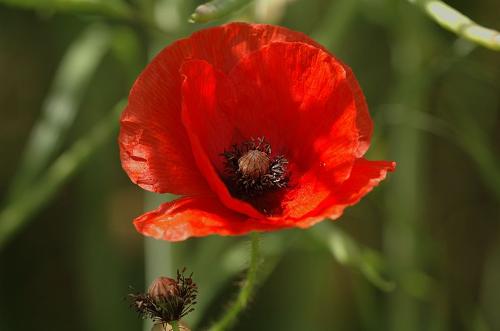 Poppy IbizaPhoto: Dary Houston in the public domain
Poppy IbizaPhoto: Dary Houston in the public domain
Ibiza has a great diversity of plant and flower species. Large parts of the island are protected areas, in total more than 40%. It is also special that there are many different landscapes, each with their own, often special vegetation.
Plants live on cliffs and rocks that can withstand the harsh sea wind and salt. This creates a very dry climate for plants, so most of them are quite small with small fleshy leaves. Some examples are yellow mountain chamomile, dwarf shrubs, samphire and poppies.
In the dunes, plants have the same problems and, moreover, must be deeply rooted to obtain water. Some examples are beach grass, juniper and daffodils.
On the mountains there are plants that can withstand strong winds. Some examples are hellebore, wild crocus, carob flower and wild violin.
More than 40% of Ibiza is covered with mainly pine forests. Special tree species are tamarind, holm oak and strawberry trees. Among these trees are honeysuckles, wild cyclamen, ferns, gorse and sarsaparillas.
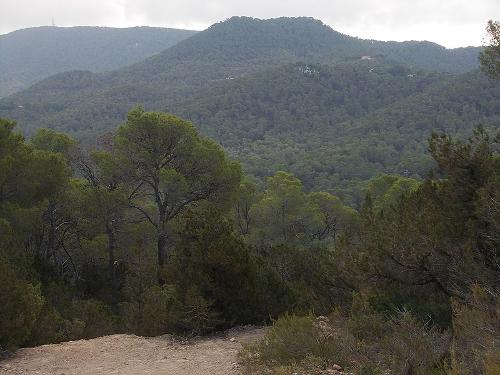 Forests IbizaPhoto: Gottfried Hoffmann CC 3.0 Unported no changes made
Forests IbizaPhoto: Gottfried Hoffmann CC 3.0 Unported no changes made
In the places where many trees were felled bushes or "gariggue" arose. This thicket can withstand the heat very well and is weathered against grazers by means of thorns and hard small leaves. It is remarkable that in this difficult climate about 20 types of colorful orchids grow. Common is the mirror orchid, rare and endangered is the bee orchid. Other plants include Italian arum lilies, broom, rock roses and asters. Furthermore, herbs such as rosemary, mint, fennel, bay leaf, thyme and mallow.
Fields and roadsides are already full of blooming poppies, daisies, clover, pink garlic, morning star, afternoon flowers and borage in March and April. Tree species are fig trees, olive trees, almond trees and carob trees.
During the winter months heather and the bright white flowers of the citrus trees bloom.
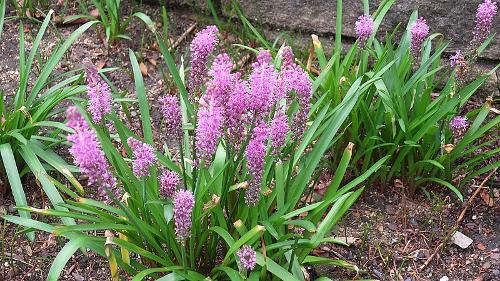 Scilla numidica, IbizaPhoto: Cultivar413 CC 2.0 Generic no changes made
Scilla numidica, IbizaPhoto: Cultivar413 CC 2.0 Generic no changes made
Ibiza and Formentera are the only places in Europe where Scilla numidica, a special hyacinth, occurs, and the only places in the world where Silene cambessedesii, a type of cuckoo flower, occurs. Other endemic plants are the Balearic horseshoe clover, the beach lion beak, the white thistle, the rock rose, the Balearic St. John's wort and the Balearic alpine violet.
Animals
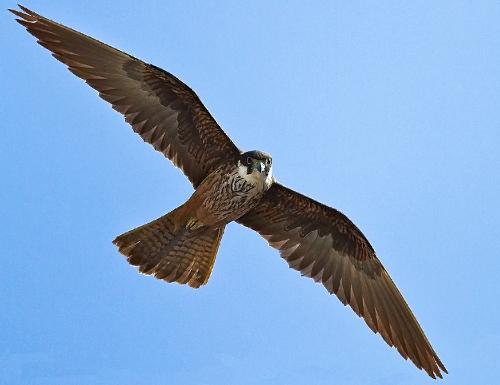 Eleonora's Falcon, IbizaPhoto: Jürgen Dietrich CC 3.0 Germany no changes made
Eleonora's Falcon, IbizaPhoto: Jürgen Dietrich CC 3.0 Germany no changes made
The animal world in Ibiza is not as diverse as the plant world. Nevertheless, there are some special varieties, such as the Eleonore falcon, the Sardinian wood warbler and the striped hop or "poepoet". Other species that occur are crested cormorants, nightingales, song thrushes, coots, sandpipers, godwits, chaffinch, green finches, bee-eaters, hop birds, shrike and clod clods. Wading birds are virtually absent in Ibiza due to the lack of ebb and flow and the less nutrient-rich warm water. When it gets colder in the north of Europe, about 200 bird species hibernate around the salt pans of Ibiza, including flamingos.
There are no large mammals, but rabbits, hares, weasels, porcupines and bats do. The rarest animal in Ibiza is the genet cat, which is, however, very rarely seen.
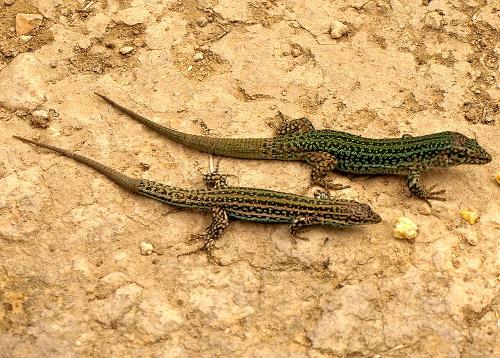 Ibizan Wall LizardPhoto: Chixoy in the public domain
Ibizan Wall LizardPhoto: Chixoy in the public domain
Other animal species are frogs, toads, about 30 lizard species (all relatives of the Ibizan wall lizard) and in the sea around the island more than 200 fish species (including grouper, barracuda), almost 100 sponge animals and about 70 shellfish and water animals. Furthermore, squid and three types of dolphins, including the striped dolphin. Off the coast there are seagrass beds (Posidonia oceanica) below sea level, which have been a UNESCO World Heritage Site since 1999.
Plants like the thorny thistle are sometimes full of snails, protecting themselves against their enemies.
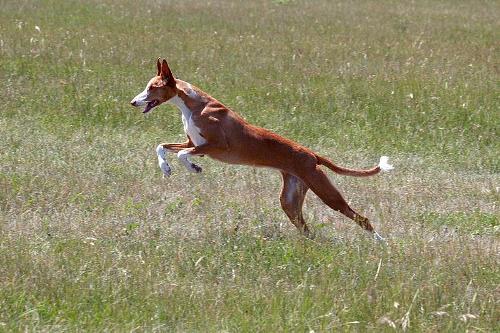 Podenco IbicencoPhoto: Lydie Heritier CC 3.0 Unported no changes made
Podenco IbicencoPhoto: Lydie Heritier CC 3.0 Unported no changes made
Special is the native dog breed Podenco Ibicenco, which is said to have already been brought to Ibiza by the Phoenicians. This high-legged Ibizan greyhound has a slender last and pointed, raised ears.
Sources
Mallorca & Ibiza, Menorca & Formentera
APA Publications
Mischke, R. / Ibiza, Formentera
Het Spectrum
Rokebrand, R. / Reishandboek Ibiza en Formentera
Elmar
Sale, R. / Ibiza & Formentera
Kosmos-Z&K
Schmid, N. / Ibiza, Formentera
Deltas
CIA - World Factbook
BBC - Country Profiles
Copyright: Team The World of Info